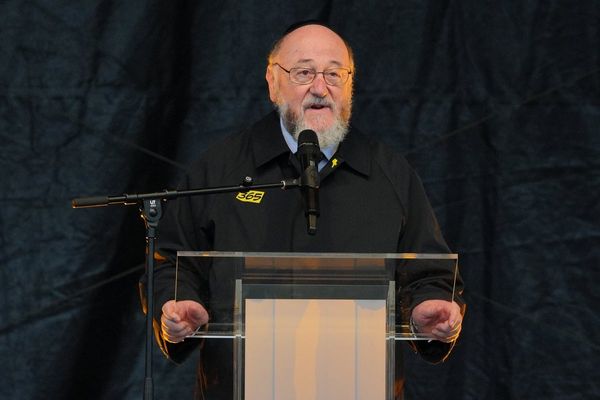
With just 2,600 places of worship for some five million Muslims, France has a shortage of mosques – and securing permits and financing for new religious sites is notoriously difficult. That leaves many worshippers struggling to find a place to pray, especially during the holy month of Ramadan.
“Quite simply, we need space,” says Abdellah, one of dozens of people lining up to enter the Javel mosque in south-west Paris for Friday prayers.
“We pray in two shifts, we’re packed in, it’s not comfortable. It’s very complicated, and during Ramadan it’s even worse. We pray as quickly as possible so that we don’t suffocate.”
The mosque, housed on one floor of a brick office building, opened in 2003 with space for around 350 worshippers. But for several years now, it has found itself struggling to accommodate those who come to pray.
“Unfortunately the south of Paris is very poorly served for Muslim places of worship. This is the only mosque in the south-west of Paris,” says the rector, Najat Benali.
The mosque offers two prayer services on Fridays to try and meet demand, she says.
“What you see now is the queue – the very long queue – for the second service, which is attended by both men and women, who have a large room that’s reserved for them.”

Thriving religion
With the number of Muslims estimated at around 5 million, Islam is France's second-biggest religion after Catholicism.
According to national statistics office Insee, 10 percent of people in mainland France aged 18-59 identified as Muslim in 2020, compared to 29 percent who described themselves as Catholic.
Muslims were more likely to attend religious services than Catholics, with 20 percent saying they went to mosque regularly in contrast to just 8 percent who regularly go to church.
Their options are limited, however. Of around 2,600 Muslim places of worship in France, most are prayer halls, not mosques, and at least two-thirds are “of modest size”, according to a 2019 report by France's former religion monitor, the Secularism Observatory.
It estimated that the existing facilities could accomodate around 500,000 Muslims maximum – yet nearly double that number are believed to attend Friday prayers.
Stopgap solutions
“You have to come very, very early to get in line,” says one young man waiting to pray at the Javel mosque.
“I actually came for the first prayer service, but I only got here 45 minutes beforehand and they stopped us at the front saying there was no more room and we had to wait for the 2pm prayers.”
The mosque has opened a temporary overflow space during Ramadan, which this year is expected to end on 9 April.
“During the Ramadan period we’ll have a temporary site where we can send part of the influx from the south of Paris ... and try to spread it out,” says rector Benali.
“But that’s really only a short-term solution to avoid disturbing the public order.”
Barriers to building
In previous years, overcrowding has driven some French Muslims to pray in the street or other unofficial sites, posing problems both for worshippers and the wider community.
But building more places to worship is no easy task.
Under a 1905 law that aimed to separate church and state, no public funds can be used to establish new religious facilities for any faith.
The same law also transferred ownership of all France’s existing religious properties – the overwhelming majority being Catholic churches – to the state. Today some 90 percent of Catholic churches in France are owned and maintained by the government, according to a 2015 Senate report.
In contrast, all of France's Muslim places of worship postdate the cut-off, and receive little or no public funding.
To maintain or expand their facilities, they rely instead on private donations – but many of the communities concerned, which often include immigrants and their children, have limited resources.
And in the past four years the French government has imposed strict controls on what funds religious organisations can accept from overseas donors who might otherwise make up the shortfall, in a bid to rein in what it calls “foreign influences” on French Muslims.
'We make do'
Plans to construct new mosques or convert existing buildings also run into administrative hurdles, Muslim leaders say.
Several projects have stalled or been called off altogether – notably in Marseille, home to one of France’s largest Muslim populations.
After opposition from far-right parties, the revocation of a construction permit and difficulties raising funding, the plan to build a large central mosque for the city’s 250,000 Muslim residents was abandoned for good in 2016.
Back at the Javel mosque, a worshipper named Fatima tells RFI: “Outside the city there’s more room, mosques and prayer halls are bigger.”
It’s different in Paris, she says. “This is the capital, a big city, so there’s no land to build on or buy up.”
She has travelled from a neighbouring district of Paris to pray here, despite the crowd.
“It’s pretty tough for prayer halls, pretty cramped,” she says. “But we make do.”
This story is based on reporting by RFI's Aram Mbengue.







